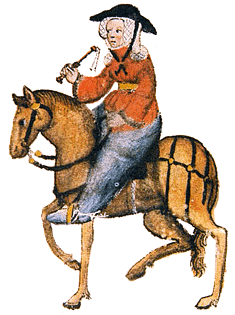Chaucer even though it is written in Middle English with hard-to-understand spelling and much different pronunciations, it was written so that anybody could read it. He wrote in "layman's terms." The stories are not too complicated (other than those like the Knight's), and his humor is written plainly; the Miller's tale contains the word "fart" at more than one instance. Chaucer does allude to various philosophical, biblical, and historical ideas and stories, but in the end he is simply portraying humanity at its core. Readers are introduced to people of all backgrounds and personalities, and Chaucer does not sugar-coat even the most raunchy of personalities.
Shakespeare also portrays humanity's flaws but in a different light. The reader, or more appropriately the audience, has to pay attention to every detail. Shakespeare is the master of metaphors. His comedies are funny, but at times hard to understand with such outstanding metaphors standing in the way of the audiences' understanding. However, the spelling is more understandable to modern day readers. One does not have to reread over and over to understand certain words such as "wight." The only instances one has to go back to reread are those metaphors that catch me and maybe some of you off-guard at times.
So the decision is up to you, is Chaucer easier to understand, or is Shakespeare?

Link: http://www.cartoonstock.com/newscartoons/cartoonists/bro/lowres/bron70l.jpg

Link:
http://tschinka.files.wordpress.com/2010/10/shakespeare-10.jpg
Blog challenge: post one of five!!

